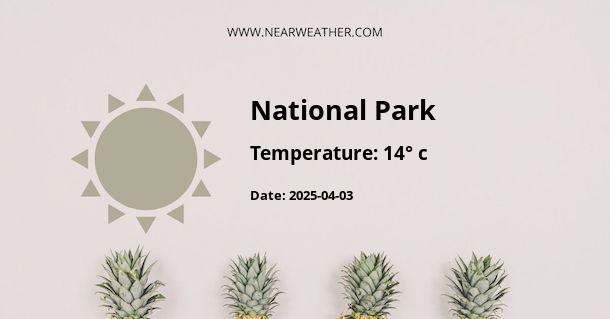Climate and Weather in National Park, New Zealand
National Park, located in the central North Island of New Zealand, is known for its stunning natural beauty and diverse landscapes. The climate in National Park is influenced by its geographical features and proximity to the Southern Alps. This unique combination creates a range of weather conditions throughout the year, offering visitors a variety of experiences and activities.
Temperature
The average temperature in National Park varies significantly throughout the seasons. Summers (December to February) are generally warm, with average daily temperatures ranging from 20°C to 25°C (68°F to 77°F). However, temperatures can occasionally reach highs of around 30°C (86°F) during heatwaves. Winters (June to August) are cold, with average daily temperatures ranging from 0°C to 10°C (32°F to 50°F). In the higher altitudes of the park, temperatures can drop below freezing, and snow is common during this season.
Autumn (March to May) and spring (September to November) are transitional seasons, with mild temperatures ranging from 10°C to 20°C (50°F to 68°F). These seasons offer pleasant weather for outdoor activities and hiking, as the temperature is not too hot or too cold.
Precipitation
National Park experiences a moderate amount of precipitation throughout the year, with the highest rainfall occurring during the winter months. The park's location on the western side of the Southern Alps makes it susceptible to the prevailing westerly winds, which bring moisture-laden air from the Tasman Sea. This results in the western slopes of the park receiving more rainfall than the eastern areas.
On average, National Park receives around 2,000 millimeters (78 inches) of rainfall per year. Rainfall is distributed relatively evenly throughout the year, with slightly higher amounts during winter. The months of June, July, and August are the wettest, with an average of 200 millimeters (8 inches) of rainfall per month. In contrast, the summer months receive around 100 millimeters (4 inches) of rainfall per month.
Sunshine Hours
National Park enjoys a moderate amount of sunshine throughout the year, although it can vary depending on the season. During the summer months, the park experiences long daylight hours, with an average of 7 to 8 hours of sunshine per day. This provides ample time for outdoor activities such as hiking, mountain biking, and exploring the park's trails.
In contrast, winter days are shorter, with an average of 4 to 5 hours of sunshine per day. However, the clear winter skies often offer breathtaking views of the snow-capped mountains and provide opportunities for skiing and snowboarding in the nearby ski fields.
Wind
The Southern Alps have a significant influence on the wind patterns in National Park. The park experiences moderate to strong winds, especially in the higher altitudes. The prevailing westerly winds can create gusty conditions, particularly on exposed ridges and mountain peaks.
During the winter months, strong winds are more common, especially during weather systems passing through the region. These winds can affect outdoor activities, particularly at higher elevations, and it is important for visitors to be aware of the weather conditions and plan accordingly.
Climate Summary
The climate in National Park is characterized by mild summers, cold winters, and moderate rainfall throughout the year. The park's proximity to the Southern Alps creates a unique weather pattern, with the western slopes receiving more rainfall and experiencing stronger winds. Visitors to National Park should come prepared for a range of weather conditions and dress accordingly to make the most of their outdoor adventures.
Here's a summary of the climate in National Park:
- Summers: Warm with average temperatures of 20°C to 25°C (68°F to 77°F).
- Winters: Cold with average temperatures of 0°C to 10°C (32°F to 50°F) and frequent snowfall.
- Autumn and Spring: Mild with temperatures ranging from 10°C to 20°C (50°F to 68°F).
- Annual rainfall: Approximately 2,000 millimeters (78 inches) with higher amounts during winter.
- Summer rainfall: Around 100 millimeters (4 inches) per month.
- Winter rainfall: Around 200 millimeters (8 inches) per month.
- Sunshine hours: Average of 7 to 8 hours per day in summer and 4 to 5 hours per day in winter.
With its diverse climate and stunning natural landscapes, National Park offers visitors a range of outdoor activities and experiences throughout the year. Whether you're exploring the park's trails, skiing in winter, or simply enjoying the breathtaking views, National Park is a destination that celebrates the beauty of nature in all its seasons.
A - National Park's Latitude is -39.183331 & Longitude is 175.399994.
A - Weather in National Park is 14° today.
A - Climate Conditions in National Park shows overcast clouds today.
A - Humidity in National Park is 84% today.
A - Wind speed in National Park is 15.44 km/h, flowing at 28° wind direction. today.
